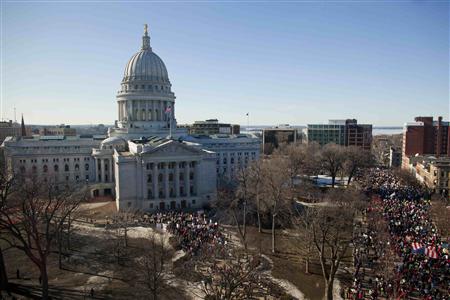Ah, how the budget wheels turn. Americans spoke loud and clear in last year’s midterm elections, demanding a balanced budget from a government run amuck with undisciplined spending.
Last year’s huge turnover in elected officials (63 house seats, 7 senate seats grabbed by Republicans as they chipped away at a commanding Democrat majority) was not limited to the national stage; no, state houses across the country were just as susceptible to the discontent of the American people, as Republicans gained control of almost a dozen state houses, now holding the majority in 37 state houses.
State legislatures across the board also prove to be partisan, with one party holding most of the control in government. So, it would make sense that the state-level governments, all of which must manage horrendous deficits themselves, could provide to the federal government a reasonable model on which to balance the budget. States with huge Republican majorities, such as Texas, Oklahoma, and Georgia, immediately caught the attention of the nation, as commentators and national legislators alike closely observed how these states would tackle the budget problem. Indeed, it is not surprising that a viable solution to budget crises sweeping the nation was presented by a state. What is surprising, though, is where the answer comes from: the cheese-headed state of Wisconsin.
The state that once elected as governor Robert La Follete, a champion of organized labor and a leader in the progressive party, has produced a new trailblazer in Governor Scott Walker. Both men stormed into Madison, Wisconsin as charismatic leaders riding a tidal wave of anti-incumbent sentiment. The similarities, however, end there. While La Follete led the state to rapid government growth and passed groundbreaking pro-union legislation, Gov. Walker has made a definitive stand against public-sector union abuse in his state, seeking to fulfill his promise to corral the deficit.
On February 11, 2011, Gov. Walker presented before the Wisconsin house his budget plan that economists suggest would rein in the state’s nearly $175 million budget shortfall in fiscal 2011. The aptly named Budget Repair Bill would require public-sector workers to cover 5.8% of their pensions and 12% of their health care. The bill also eliminates the right of unions to collectively bargain with their employers for changes to their benefits, capping the employer (government) spending on pensions and health care costs at a “measly” 94.2% and 88%, respectively. By effectively slashing about 10% of the entitlements promised to the public sector unions, Wisconsin could greatly diminish the state’s debt, and the savings will in part be used to improve the state’s correctional facility.
At this point, the reader inevitably wonders and speculates about the amount of time before protests erupt and all of Hades breaks loose. Indeed, benefit cuts to union workers tend to ruffle the feathers of Big Labor, usually setting off retaliatory (and, surprise surprise, well-televised) protests. The Budget Repair Bill was no exception, as unionized sanitation workers, teachers, and lawmen alike took to the capitol building for one week in what one onlooker called “Cairo moved to Madison.” They argued that removing the right of unions to collectively bargain for benefits changes infringed on their freedom and crushed their voices, leaving public sector unions prey to their big, bad government employer.
First off, let me say that in looking to reduce government spending, and indeed in approaching any pecuniary situation, the government ought to approach the problem from a private sector perspective. After all, the incentive to turn a profit drives the private sector to minimize costs while maximizing return on investment; in other words, the capitalist company makes deftly sure that it is getting the most bang for its buck. The state of Wisconsin, steeped in debt along with the rest of the Union, is analogous to a cash-strapped, debt-ridden company. Because Wisconsin Co., if you will, is opposed to raising the prices (taxes) for its services, which would inevitably drive away the consumer (tax payer) to lower prices and greener pastures, the company would invariably next turn its focus to cutting costs, the biggest of which (32% of the Wisconsin budget) is labor entitlements. Cutting these benefits is the only way to effectively balance the budget; laughable measures like freezing discretionary spending and cutting prison costs will not yield substantial results.
The contributions to pension and health care costs that Wisconsin asks from its employees are very fair by private sector standards: the average private sector worker pays around 6% of their pension and about 25% of their health care costs. If in the private sector, Wisconsin would seem even magnanimous in its paltry requirements.
Furthermore, the Big Labor characterization of the bill as anti-freedom and oppressive is false and short-sighted. Public sector unions would still be allowed to bargain for where base pay is set and for increases in employment. The unions would be able to argue for restructured hours, pay raises, and changes in working conditions. They would not, however, be allowed to fight for higher employee co-pay on health care and pensions: the rates of employee contribution would stay at 5.8% and 12%, respectively. By setting permanent rates of employee contributions, the government can slash the deficit without directly cutting the employee salaries.
Ironically, the unions oppose this plan, a plan that would actually result in employees keeping more of their money than they would with a base pay decrease. They facetiously paint the fiscally minded government legislators as demon-like villains, hell bent on robbing the Average Joe of his last sixpence. Rather, the bill sets a reasonable line for employee contributions in the place of the overtly unreasonable employer pay in place right now, in Wisconsin and states across the country. It does take away the right of public sector unions to steal from the American people by demanding gargantuan employer-provided benefits. For far too long, public sector unions have robbed the American people blind by demanding expensive and unsustainable benefits during visceral “collective bargaining” sessions. And our legislators, completely unmotivated by and independent of turning a profit, have time and again acquiesced to the demands. When state and national law makers accept the dirty work that goes in to creating a sustainable government and stop writing off debt to the next generation, we can achieve a smarter, sleeker, higher performing government.
SOURCES
- http://abcnews.go.com/Business/wisconsin-state-workers-protest-governor-scott-walkers-proposed-budget-cuts/story?id=12932013&page=1
- http://www.wisgov.state.wi.us/journal_media_detail.asp?prid=5622&locid=177
- http://www.bloomberg.com/news/2010-08-19/u-s-budget-deficit-forecast-increased-by-cbo-to-1-066-trillion-for-2011.html
- http://www.npr.org/series/elections/
- http://www.time.com/time/politics/article/0,8599,1968638,00.html






